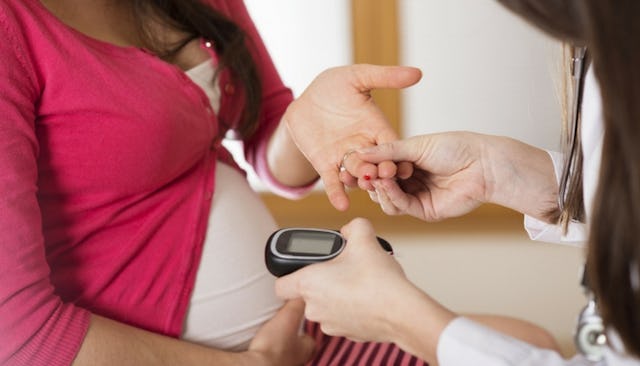I Was Blindsided (And Overwhelmed) By My Gestational Diabetes Diagnosis

So, there I was, minding my smug business with this third pregnancy, thinking I knew all the things and that I had this baby-on-board business totally down pat when I started having some weird symptoms.
First, I was unusually thirsty. By thirsty, I mean, I was downing a liter of water when I first woke up in the morning and then two more throughout the day. I could have drunk a Costco-sized case of bottled water and still felt parched — it was like one of those curses you read about in a fairy tale or Greek mythology.
Second, my vision started to get blurry, which I have to admit I ignored because I had remembered reading that if you’re already nearsighted as I am, pregnancy can make your vision a bit wonky. But I was also tired all the time in a way that went beyond regular pregnancy or run-of-the-mill mom type of fatigue.
I noticed these symptoms right around week 27, so when I failed the one-hour glucose test on week 28 and then failed the three-hour glucose test on week 29, it came as absolutely no surprise when I got the call that I had been diagnosed with gestational diabetes.
If you’ve never heard of GD, let me lay some knowledge on you. It only happens during pregnancy and is not permanent 90% of the time. But if you’ve been diagnosed with GD, you have an elevated risk of developing Type 2 diabetes later in life, and so learning how to limit sugar in your diet and get an appropriate amount of exercise is important for reducing those future risks.
Also, if you choose to breastfeed, your risk of developing type 2 diabetes later in life is cut in half. Half. Because breasts are magical.
While your belly is swelling out to crazy proportions your body has pregnancy hormones crashing around like two 5-year-olds ninja-fighting on the couch. Those hormones can sometimes suppress insulin, which is what turns your blood sugar into energy. The result is that sugar in your blood rushes into your unborn child causing significant weight gain and strain on your baby’s not-yet-developed system. It can cause premature birth, jaundice, and a risk of developing type 2 diabetes. Not fun.
Getting the news was overwhelming. My first thoughts turned to that cheesecake I ate and all the extra bites of french fries and those mango smoothies and whatever else I shoved into my mouth. I am eating for two after all, right? This child is not even born yet and my mind was already swimming with guilt. I felt like a giant (literally, giant) asshole.
Before my appointment to meet with a diabetic nurse and a dietician, I was already googling everything I could find about sugar and gestational diabetes. I called my doctor and she suggested that I try restricting sugar, but without yet knowing my daily sugar levels, my mind went into overdrive and I signed up for a complete sugar detox.
That. Fucking. Sucked.
For five days, I was loopy and exhausted while my body learned how to adjust to consuming only lean meats, nuts, fresh veggies, and limited fruits. Gone was the coffee with the creamer. Gone were the mocktails with tonic that had sugar in them and slices of fruit to jazz up the fizzy sweet water. Gone was the cheesecake.
By the time I made it to day six of a sugar detox, my uterus, apparently a cranky old bitch, reacted, and my butt landed in the hospital with false labor contractions.
I’m fine. The baby is fine. But I had to break up with sugar, which if you’ve never done this is very difficult. Sugar is in everything, and I suddenly had to look up the sugar and carb contents of anything before I took a bite. This is annoying, but necessary, and has forced me to reconsider what I think is a healthy portion and also what I consider a “sweet treat.”
Gestational diabetes may be a temporary setback in my road toward growing a healthy baby, but it is one that has fundamentally changed how I approach food. For many years food has been a comfort to me, but now I must recalibrate that kind of thinking and look at food as fuel for my body and developing baby. This particular aspect of gestational diabetes is not a bad one. The rest? I’m not going to lie, it kinda sucks.
This article was originally published on